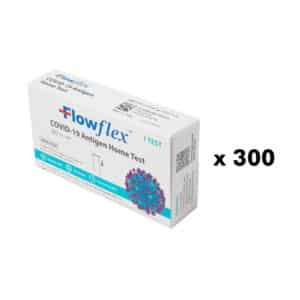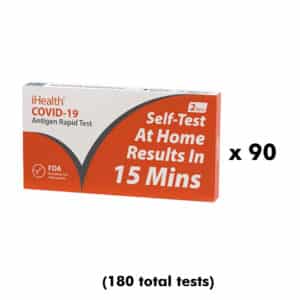Rapid Test For Sale
Showing all 2 results
-

FlowFlex – Home COVID Tests – 2025 Exp. (Carton of 300 Tests – $7.95/test)
$2,385/carton of 300 tests ($7.95/test) -

iHealth – Home COVID Tests (Carton of 180 Tests)
$1024.20/carton of 180 tests ($5.69/test)
Rapid Testing Kits for Sale
Rapid virus testing kits are critical in preventing the spread of the coronavirus that causes COVID-19. Rapid testing is so vital to decreasing virus transmission that the National Institutes of Health (NIH) started the Rapid Acceleration of Diagnostics program in April 2020. The program supports the development, production and distribution of accurate, rapid coronavirus testing kits nationwide.
Rapid testing allows employers, healthcare facilities and schools to quickly and easily identify people who have the virus, whether they show symptoms or not, so they can isolate themselves and reduce the chance of infecting others. Early detection of the coronavirus also allows people to get the care they need before the disease progresses, possibly decreasing the severity of COVID-19.
If you’re interested in purchasing rapid COVID-19 testing kits you can use at home or in the workplace and would like more information, you’re in the right place. Below, we cover the basics of current rapid tests for sale and where you can buy them.
COVID-19 Antigen vs. Antibody Tests
First, it’s essential to know the difference between antibody and antigen tests. Here’s an overview of each:
Antigen Tests
An antigen is a molecule found on the surface of a pathogen, such as viruses and bacteria. Antigens trigger your body’s immune response. An antigen test can:
- Detect an active SARS-CoV-2 infection in the body.
- Look for antigen markers in nasal or throat fluids.
Antigen tests do not tell someone if they had a previous infection and are meant for diagnostic or screening purposes. If someone tests positive on a COVID-19 antigen test, they can isolate themselves immediately, prevent spreading the disease to others and get the help they need.
Antibody Tests
Your immune system produces antibodies to fight antigens. Antibodies, also called immunoglobulins, are Y-shaped proteins. These proteins bind to antigens and signal other cells in your immune system to eliminate the pathogen. An antibody test can:
- Detect previous SARS-CoV-2 infection.
- Look for antibodies in the blood.
Antibody tests, also called serology tests, are not meant for diagnosing current infections since it takes time for the body to build antibodies. Instead, these tests are usually performed after a person fully recovers from COVID-19.
An antibody test can help people track the spread of the coronavirus. These tests also help scientists determine how many people have been infected with SARS-CoV-2 and possibly have immunity to the virus. But researchers still do not know how long immunity lasts after infection.
At SUNLINE Supply, we sell both types of rapid testing kits.
Rapid Antigen Testing Kits for Sale
Rapid antigen testing kits detect active COVID-19 infections by identifying SARS-CoV-2 antigens in collected samples of nasal and throat fluids. Antigens are molecules of a virus that trigger a response from the body’s immune system. When your body detects these unfamiliar antigens, it responds by producing antibodies that bind to the antigens and help your immune system expel the virus.
In COVID-19 antigen testing, samples are collected and tested to determine if distinctive COVID-19 spike protein antigens are present. Samples are applied to a testing paper strip that contains specially formulated antibodies chosen to bind to the SARS-CoV-2 protein antigens. If binding occurs, the test presents positive results to indicate an active COVID-19 infection.
Antigen Testing Kits for Medical Use
We offer a variety of antigen testing kits for use of medical professionals.
Professional use COVID test kits are authorized for use in laboratories in the United States, certified under the Clinical Laboratory Improvement Amendments of 1988 (CLIA), 42 U.S.C. §263a, to perform high, moderate or waived complexity tests. Professional use tests are also authorized for use at the Point of Care (POC), i.e., in patient care settings operating under a CLIA Certificate of Waiver, Certificate of Compliance, or Certificate of Accreditation.

